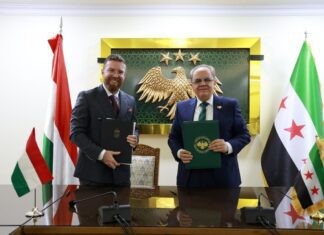
A critical side event held earlier this month at the Palais des Nations in Geneva, alongside the 57th session of the Human Rights Council (HRC), addressed the potential referral of Syria’s Assad regime to the International Criminal Court (ICC) for war crimes and crimes against humanity. The event, held on October 3, was organized by the Syrian Forum in collaboration with Legal Action Worldwide (LAW), and sponsored by the EU and the UK.
Participants in the session examined the legal pathways available for referring the Syrian file to the ICC, drawing comparisons with previous legal precedents such as the referral of Myanmar’s crimes of forced displacement to the Court. This discussion comes at a time when international law is increasingly seen as a viable avenue for addressing war crimes, as evidenced by recent arrest warrants issued against Israeli and Hamas leaders following the violence in Gaza.
One of the event’s key discussions focused on leveraging the legal precedent set by the ICC’s investigation into the forced displacement of Rohingya Muslims from Myanmar into Bangladesh. This case demonstrated the ICC’s capacity to intervene even in situations where direct international jurisdiction is challenged. The presenters argued that a similar approach could be taken for Syria, where forced displacement, alongside other crimes such as extrajudicial killings and torture, has been well-documented.
Yasser Tabara, head of strategic planning at the Syrian Forum, highlighted the significance of bypassing the deadlock imposed by the UN Security Council. Russia and China have repeatedly vetoed attempts to refer Assad to the ICC, blocking previous efforts. Tabara pointed out that using the Myanmar model could open an alternative legal route that circumvents the Security Council, allowing for ICC jurisdiction without requiring a UN resolution.
Tabara indicated that the veto that has blocked justice for Syrian victims does not mean the road is closed. Noting the Myanmar precedent offers hope for accountability, and countries supporting international justice must stand with us in this effort.
The events in Gaza and Palestine and the drives for justice on the international stage draw parallels between the Assad regime’s crimes in Syria and those committed by the Israeli government against Palestinians.
Both cases involve the use of military force against civilian populations, widespread displacement, and accusations of war crimes. Recent developments, including ICC investigations into Israeli actions during the ongoing Israeli-Palestinian conflict, further highlight the growing relevance of international law in holding state actors accountable.
The issuance of arrest warrants against Israeli and Hamas officials signals a new era of international scrutiny over actions in conflict zones. Antonia Mulvey, Executive Director of LAW, emphasized the importance of the ICC in delivering justice where national and regional mechanisms have failed.
Mazen Darwish, Director of the Syrian Center for Media and Freedom of Expression, also pointed out the importance of ending impunity for the Assad regime. Darwish emphasized that continued impunity in Syria only exacerbates the conflict, threatening not only regional but also global stability. He reiterated that the time to act is now, especially with growing international support for legal mechanisms such as the ICC.
The use of international legal bodies like the ICC has gained momentum, particularly in cases like Myanmar, Syria, and Israel. The event’s speakers stressed that strengthening the role of the ICC is essential to ensuring that perpetrators of crimes against humanity are held accountable, whether in Syria, Palestine, or elsewhere.








